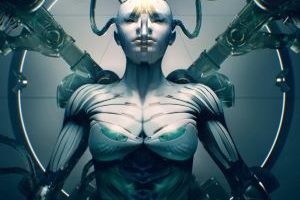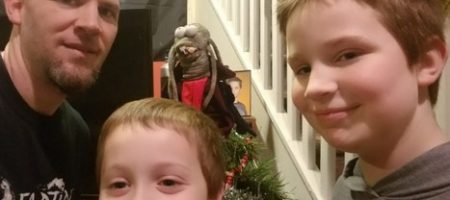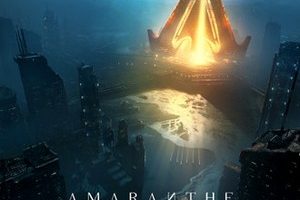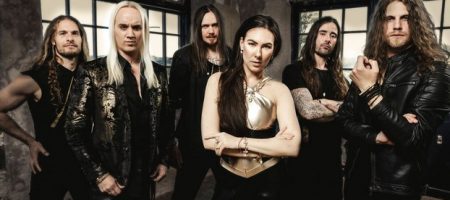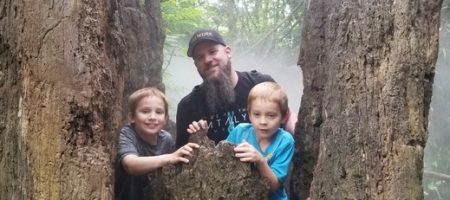Dragonland – A Celestial Journey
Tuesday, 1st November 2022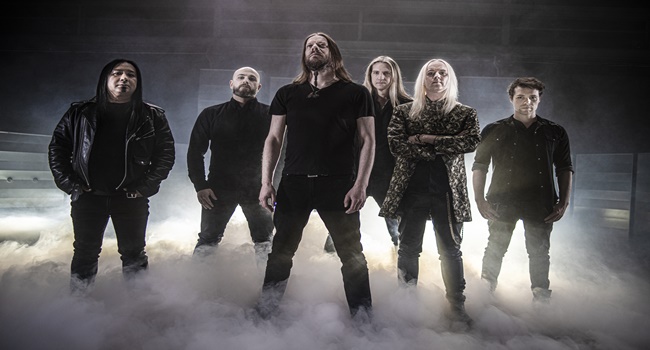
Eleven years between records seems like an eternity in the metal realm – but such is the case for Swedish symphonic power metal band Dragonland as their latest record The Power of the Nightstar hits the streets. An ambitious sci-fi conceptual record encompassing thirteen tracks, the sextet leave no stone unturned to execute material that remains vital, relevant, and modern while keeping the traits that gave the band global appeal during the 2000’s. We spoke to keyboardist Elias Holmlid who was able to bring us up to speed on the eleven-year break between studio records, how the band developed a sci-fi conceptual storyline for the album, video work and single choices, memories surrounding Japan and the Starfall album, thoughts on Olof’s work / success with Amaranthe, plus future plans.
Dead Rhetoric: The Power of the Nightstar is the latest Dragonland album – the sixth studio album and first in over a decade for the group. Outside of the pandemic and guitarist Olof Mörck’s main responsibilities for Amaranthe, were there other factors that caused a prolonged absence for the productivity of the band?
Elias Holmlid: Yeah, absolutely. There were other factors that are more important than those two. For example, right after the release of the Under the Grey Banner album, I started a full-time job as a video game developer and spent a long time trying to excel at that. Since Olof and I were the main songwriters before on the previous albums, we have a busy schedule and we tried to meet up, but it’s been very hard. I started writing on my own, after a while Jesse the other guitarist started writing as well, so we started teaming up. He hasn’t really written anything before, so it was really cool to be writing with him. And also, of course, having kids and all that stuff took time, all these life things. We could have started a bit earlier. Olof and I wrote the first song in 2014 and started writing more in 2016. We went to Australia and Japan on tour in 2018, and after that we had a creative burst, so we pushed for getting this done. The production also took a little while, the release schedule, it adds to the time.
Dead Rhetoric: How would you assess the main recording and songwriting sessions for this set of material – and where you see the major differences for Dragonland on this record compared to the previous discography?
Holmlid: Our songwriting processes these days is kind of the same. In the early days we wrote in the rehearsal space, which was really chaotic. And then we started writing in our home studios, and that process is basically the same. We start with the vocal melodies, the harmonics. At that point it doesn’t have to be metal, and then things get orchestrated with the guitars and everything. We will start with an idea for the chorus, but it’s the vocal melodies that are the driving force.
And also, for the production it was the same. I recorded the drums with Jacob Hansen, and we did most everything else in our home studios. It’s a good process, because I assemble all the files and see if everything works, get feedback on that. It can be quite cumbersome, but we like the outcome. Jacob mixed and mastered it as last time. It’s Jacob’s type of sound – we definitely went for a bit more modern sound than what we had on Under the Grey Banner from the last time.
Dead Rhetoric: Were there any particular songs that were more of a challenge than others, or went through many revisions to get to the final outcome?
Holmlid: I think “Final Hour” took a long time, because there were so many different parts. It was a bit involved. The intro we spent a lot of time on to get things the way I wanted them to be. Maybe “The Scattering of Darkness” we had some revisions as far as the structuring of certain parts. Sometimes that happens, but nothing too dramatic.
Dead Rhetoric: You went for a sci-fi conceptual album in terms of the lyrical content. How did the storyline come about – were you conscious of developing the story hand in hand with the music, and what challenges/surprises came up during the process?
Holmlid: When we started writing the first couple of songs, we had an idea that this would be a sci-fi oriented album. There was no full story – “A Light in the Dark” was the first song that we finished. Jonas came up with the sci-fi lyrics as an overview, and we realized then that this could be a sci-fi album. We wrote one more song and realized that if we were going to do a concept album, we needed to realize what things would be like in a broad sense for the story. We knew “A Light in the Dark” would be the second track, then looking at songs like “Celestial Squadron”, we knew where to place them. We had a broad sense of the fast songs, taking it down, finding a good balance because we knew we needed some pauses there in the middle. That was the process.
Jonas wrote all the lyrics this time, and at the end Olof came in and wrote a forward to the tracks which you can read in the booklet to flesh out the story. That was basically the process.
Dead Rhetoric: And when it comes to the cover art, was that something you had also given the artist the storyline so that they could capture the essence for the front cover?
Holmlid: My idea was to have something like this alien looking guy looking out from a spaceship. That was basically the description, I’m really fond of this style. I think it turned out really cool. We found this guy online; he had a cool portfolio. We were really happy we were able to come to good terms to have him work with us.
Dead Rhetoric: The video for the title track has received over a quarter of a million views now on YouTube. How did you feel the video shoot went, as the darker lighting sequences around the band performances definitely give the visuals an atmospheric vibe?
Holmlid: Yeah. When we decided to work with Grupa13, Olof knew of them because Amaranthe has worked with them a lot. We presented ideas to them – we knew it was out of our budget to do a full sci-fi like video. We told them about the concept, and we looked into this aquarium-like building, but that didn’t work out because there was no time to rent (the space). We wanted to shoot the video then with red lights, blue lights, and lots of smoke. That was it, I thought they did a really great job with the quality. Next time hopefully we can have some CGI stuff in there. Sometimes you see bands do that, but they don’t have the budget, and it looks like you need a Hollywood budget to get the best look out of that. Better to keep things simple.
Dead Rhetoric: When it comes to picking out the singles before the record is released, is that an easy process amongst the band to decide which tracks to feature?
Holmlid: It was actually a bit hard. We bounced around quite a few songs. In the end, these are the most logical tracks. We were thinking of having “A Light in the Dark” as one of the first singles, but then eventually we thought about the title track. It’s hard to make the final decision. They are not super representative of the album as a whole, because “Final Hour” for instance is more cinematic. In the end, we made the best decisions that we could.
Dead Rhetoric: Do you believe the cinematic, electronic, and symphonic elements that developed this time around expand your duties and outlook for the keyboard work? How do you balance things out as a sextet to get the best performances in a clear manner without overloading the listener – is this where the magic of producer Jacob Hansen comes into play?
Holmlid: I think my aim with keyboards is to make a really big texture. I try to keep out of the higher frequencies, because that’s where the vocals are. I think that makes the job for Jacob much harder because there is a lot of stuff competing in the mid-range with the keyboards, guitars. For me, it’s usually the case where they may be eighty tracks or something, it doesn’t really sound that big. If you take it out, it becomes smaller. The aim is to make things broader. Jacob is a wizard, you can hear the drums, everything has space. It sounds very dynamic, but in a way, things are also compact. I have no idea how he does it, he’s a great mixer.
Dead Rhetoric: Over the years you’ve appeared on numerous albums from other bands/projects as a keyboardist. What have been some of the more memorable performances in this regard, and what do you enjoy most regarding this work that differs from what you do with Dragonland?
Holmlid: There have been a few projects. Back in the day it was really cool to do stuff for King Diamond. That was many years ago now. Working with Ad Infinitum is cool, I can handle the orchestration pretty well. I did work on their forthcoming work as well; they are really great guys to work with. I haven’t done so much work in the last ten years.
Dead Rhetoric: How would you describe the band chemistry and relationships within Dragonland? Do you believe your goals and outlook for what you want to achieve and accomplish have changed from the early years of the band to how you view things today?
Holmlid: I think so. If we were to go back to the Starfall album, at that time we had lots of time to work on the music. We wanted to make the albums very strong. Then I realized after getting these albums out, we came to the conclusion that you have to do a lot of work and tour a lot to make a living. Nowadays we have a more realistic viewpoint of things. I still love writing songs, and when we do come out to play, I love it as well, but we have never really played a lot. We don’t have a driving force in the band that really books the gigs and pushes that aspect. We are happy to write music and make albums, we plan to do that more often than the eleven years in between the last two albums. The next album will not take that long to release.
Dead Rhetoric: You are now in business for yourself as a game developer. What is that like and how do you view doing things in that realm compared to your work in Dragonland?
Holmlid: I work for another business now on the gaming side and development, I’m a developer and write code. In my previous work I wrote the soundtracks for video games as well beyond the development. And that’s another reason why Dragonland was taking longer to write for, I had a lot of crazy output. Since I only do coding now, I have more time to write music. For me now, it’s more like an eight to five job. Working for computer games, you can work all day and night, seven days a week. It’s not like that for me anymore, I can have my spare time to do my music.
Dead Rhetoric: What is a pivotal or critical moment that helped shape your musical career?
Holmlid: I think when we went to Japan in 2003, that was a really cool experience. After that we started to write the Starfall record, we were really inspired at the time. That would be an ideal memory. Japan was a dream come true to play. It was good to go back to Japan fifteen years later in 2018.
Dead Rhetoric: Does Olof’s success with Amaranthe surprise you?
Holmlid: Personally, he’s a super dedicated guy. Whenever he starts to do something, like during the Starfall time period, he dedicated himself to the guitar and he was playing it all day. When they started out, they did stuff in the correct way – they were very adept with the social media thing. There was Myspace at the time, and they had this great concept at the time, it felt like they really knew what they needed to do to succeed. I’m not really surprised, but they are getting really big now, I’m very happy for him. There are not many bands that are working now at the level they are at.
Dead Rhetoric: How has a failure, or apparent failure, set you up for later success? Or do you have a favorite failure of yours, and how did you end up pushing through?
Holmlid: That’s a great question. I feel like with Starfall it may have been a bit like a failure because the album could have become better. We spent so much time in pre-production, we recorded the tracks multiple times. We had much less time to record in the studio – it was a mistake to not to try to make things so perfect in pre-production, because you will not get that result in the end. Not that the end result was worse – you get used to certain sounds. Even though the production wasn’t as good as the final one, all the little details that we spent so much time on, it became something else. It was a lesson – to make the pre-production a bit broader and not as detailed.
Dead Rhetoric: What’s on the agenda for the band over the next twelve months to support the record? And will there be other guest appearances on records to check out and look forward to with your work down the line?
Holmlid: I finished with the new Ad Infinitum album – I did some orchestration on that. For the next twelve months, we are starting to think about the next Dragonland album. We are looking into planning gigs. We have one gig in Denmark, a festival in April. Apart from that, there hasn’t been anything else announced. As we see it now, it was a struggle last time, I changed computers, it slowed down the process. We will start earlier than seven years to work on the next set of material.











